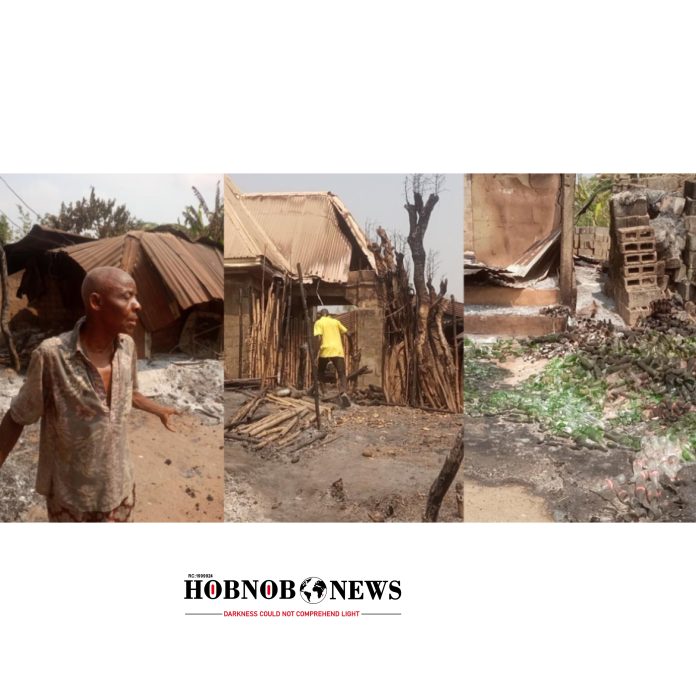Years of relentless attacks by suspected herdsmen have left a devastating trail of destruction and displacement in farm settlements across Eha-Amufu, Isi-Uzo Local Government Area of Enugu State. At least 44 settlements, known as ‘Ndiagu,’ have been overrun, forcing residents to flee to neighbouring communities for safety. The affected areas include Abor Ishala, Mgbuji, Agu-Amede, Eha-Agu, and Umuhu.
The most recent attack targeted Ndiagu Amofia village in Umuhu Eha-Amufu on February 28, displacing residents once again. In Abor, at least nine farm settlements were overrun, with the assailants taking over homes. These include Ogomungo, Ngele-Akpankpa, Okwum, Agerie, Ezegwu-Abor, Ashinu, Ovokpo, Mgbede-Abor, and Ngele-Acho. In Umujoovu village, four settlements—Mgbede, Edu, Nditsion, and Onuashinu—were sacked.
In Agu-Amede, nine settlements fell to the attackers: Okpokwu, Uzamuado, Oduba-uzame, Onuchukwu, Efuakpa, Ogeriaba, Okpurugwu, Iyiasa, and Ikpakpara. Eha-Agu lost three settlements—Odenigbo, Ashinu, and Isu—leaving residents completely displaced. Meanwhile, in Mgbuji, 18 settlements were taken over, forcing residents to flee to Enugu or other safer locations. These settlements include Okpokwu, Okpurugwu, Obodomba, Uloumuorgirie, Ugwuoka, Ngele-Aguiyi, Ogbete-Obibi, Ogbete-Umulo, Agerie, Unuanu, Obodo-Ede, Ukwuakwa, Unomgbede, Iyiasa, Onu-Ashinu, Ubi, Ezegwu, and Omulo.
According to a SaharaReporters investigation, the attacks began in 2002 but intensified from 2020 during President Muhammadu Buhari’s administration. Chief Obeagu Odoh, a kinsman of the Isi-Uzo LGA Chairman, confirmed that residents have been displaced with no sign of resettlement.
“Some are in Enugu, others in makeshift camps, while some squat with relatives. None of the farm settlements are accessible. If you try, you either get killed, kidnapped for ransom, or barely escape with injuries,” said Chigbo Okibe, another resident.
He noted that December 2024 marked the first time in three years that Christmas was celebrated in Eha-Ohala. “Almost a year ago, three people from Abor went to harvest crops and have not been seen since. The case was reported to the police, but no one has been held accountable. Herdsmen now occupy abandoned homes, and security agencies have done nothing to restore the people to their lands.”
Okibe added that government intervention has been minimal. “During the peak of the Mgbuji crisis, the government built roads to some settlements, and there was even a military barracks in Mgbuji. But soldiers were withdrawn, and from that point to Abor is a long distance.”
He lamented the government’s absence in Eha-Ohala, which includes Abor and Umujoovu. “Our land stretches to Benue State, yet the Fulani refuse to leave. Instead, they bring in more people.”
Mrs. Chinyere Odoebe, a local leader, said residents feel helpless. “We don’t have the kind of weapons they do. Our only protection comes from local hunters and vigilantes, armed with Dane guns. But when security forces see us with those, they accuse us of carrying weapons. Meanwhile, when Fulani attack, nothing happens.”
She pointed out homes that now lie desolate because their occupants were killed. “Security agents only come after attacks—to collect bodies,” she said.
According to Odoebe, the Fulani appear to have a strategy to seize more land, particularly in Agu-Amede, Eha-Ohala, Abor Ishala, Mgbuji, and parts of Umuhu. “As I speak, Abor residents are fleeing, Umujoovu is evacuating, and Mgbuji is nearly empty. The entire Eha-Amufu is gone.”
She accused politicians of downplaying the situation. “Some go on air claiming nothing is happening, but that’s not true. If you saw what happened in Nkalaha, Ebonyi State, you’d understand why our people are terrified.”
Mrs. Angela Ogenyi stated that over 180 people had already been killed before the most recent attacks. “Even when it looks like peace has returned, people are still being killed or injured while working on their farms.”
She recalled a recent case where two missing persons were reported to the State CID. “We submitted evidence, but nothing has been done. Meanwhile, officials keep insisting that everything is fine.”
She criticized security operatives for failing to protect displaced residents. “When they were deployed, they refused to go into areas occupied by the invaders. Even the school in Ogbete, reconstructed by former Governor Ifeanyi Ugwuanyi, was burned down by Fulani herdsmen. That school served displaced children from Mgbuji, Abor, and Umujoovu.”
According to Ogenyi, residents now suffer from hunger. “Before, our parents farmed while we supported them with money. Now, they can’t farm, and we must provide everything. Worse still, they aren’t even allowed to stay in their homes.”
She condemned the destruction of farms. “They claim their cows are being killed, yet they destroy all our crops. If we plant cassava, they uproot it for their cattle. If we plant yam, they trample it. Rice fields? Those are a feast for them.”
Chibuzo Olinya, another displaced resident, described how herdsmen systematically dismantled communities. “They either burned houses or removed roofing sheets. Even the Catholic Church and primary schools were stripped bare.”
He explained how Fulani settlers have taken over abandoned properties. “Some of our people tried to reclaim their homes but found Fulani women living there. When they protested, the women alerted their men, who then surrounded them with AK-47 rifles.”
Olinya speculated on the motives behind the attacks. “It’s only Benue communities that border us, not the Fulani. Yet they keep coming to kill our people. When we were younger, Fulani herders were peaceful. Now, it’s a different breed.”
Efforts by newsmen to obtain comments from the Enugu State Police Command proved futile. The Command’s spokesperson, SP Daniel Ndukwe, did not respond to calls or messages. Likewise, the state government remained silent, with Governor Peter Mbah’s media office declining to comment on the crisis.

